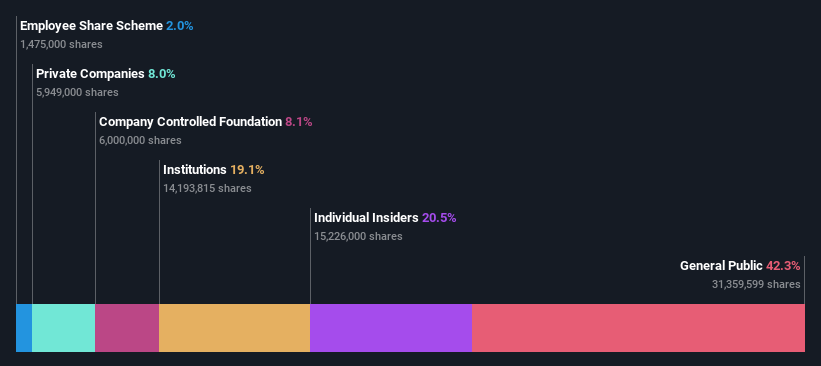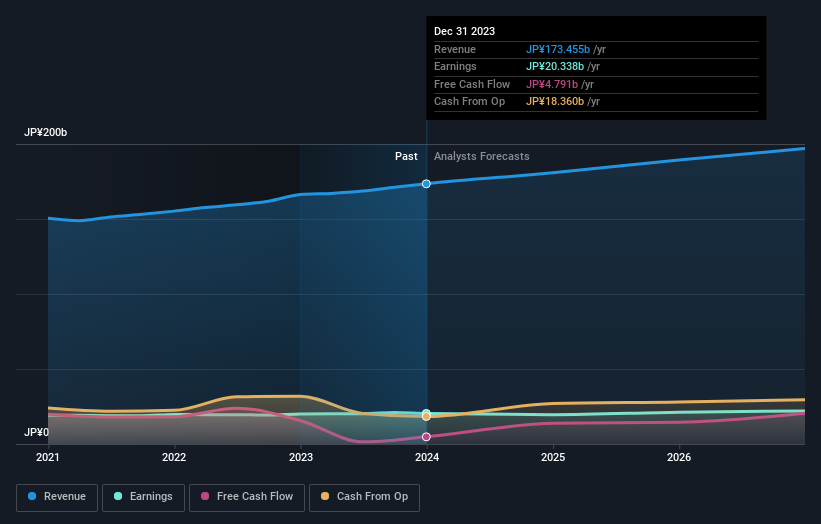Stock Analysis
- Japan
- /
- Personal Products
- /
- TSE:4967
Kobayashi Pharmaceutical Co., Ltd.'s (TSE:4967) largest shareholders are retail investors with 42% ownership, insiders own 21%

Key Insights
- Significant control over Kobayashi Pharmaceutical by retail investors implies that the general public has more power to influence management and governance-related decisions
- 50% of the business is held by the top 13 shareholders
- 21% of Kobayashi Pharmaceutical is held by insiders
To get a sense of who is truly in control of Kobayashi Pharmaceutical Co., Ltd. (TSE:4967), it is important to understand the ownership structure of the business. With 42% stake, retail investors possess the maximum shares in the company. Put another way, the group faces the maximum upside potential (or downside risk).
And individual insiders on the other hand have a 21% ownership in the company. Insiders often own a large chunk of younger, smaller, companies while huge companies tend to have institutions as shareholders.
In the chart below, we zoom in on the different ownership groups of Kobayashi Pharmaceutical.
Check out our latest analysis for Kobayashi Pharmaceutical

What Does The Institutional Ownership Tell Us About Kobayashi Pharmaceutical?
Institutions typically measure themselves against a benchmark when reporting to their own investors, so they often become more enthusiastic about a stock once it's included in a major index. We would expect most companies to have some institutions on the register, especially if they are growing.
Kobayashi Pharmaceutical already has institutions on the share registry. Indeed, they own a respectable stake in the company. This suggests some credibility amongst professional investors. But we can't rely on that fact alone since institutions make bad investments sometimes, just like everyone does. If multiple institutions change their view on a stock at the same time, you could see the share price drop fast. It's therefore worth looking at Kobayashi Pharmaceutical's earnings history below. Of course, the future is what really matters.

Hedge funds don't have many shares in Kobayashi Pharmaceutical. From our data, we infer that the largest shareholder is Akihiro Kobayashi (who also holds the title of President) with 12% of shares outstanding. Its usually considered a good sign when insiders own a significant number of shares in the company, and in this case, we're glad to see a company insider play the role of a key stakeholder. For context, the second largest shareholder holds about 8.1% of the shares outstanding, followed by an ownership of 4.8% by the third-largest shareholder.
After doing some more digging, we found that the top 13 have the combined ownership of 50% in the company, suggesting that no single shareholder has significant control over the company.
Researching institutional ownership is a good way to gauge and filter a stock's expected performance. The same can be achieved by studying analyst sentiments. There are a reasonable number of analysts covering the stock, so it might be useful to find out their aggregate view on the future.
Insider Ownership Of Kobayashi Pharmaceutical
The definition of company insiders can be subjective and does vary between jurisdictions. Our data reflects individual insiders, capturing board members at the very least. Management ultimately answers to the board. However, it is not uncommon for managers to be executive board members, especially if they are a founder or the CEO.
Insider ownership is positive when it signals leadership are thinking like the true owners of the company. However, high insider ownership can also give immense power to a small group within the company. This can be negative in some circumstances.
Our most recent data indicates that insiders own a reasonable proportion of Kobayashi Pharmaceutical Co., Ltd.. Insiders own JP¥82b worth of shares in the JP¥401b company. That's quite meaningful. Most would say this shows a good degree of alignment with shareholders, especially in a company of this size. You can click here to see if those insiders have been buying or selling.
General Public Ownership
The general public, who are usually individual investors, hold a 42% stake in Kobayashi Pharmaceutical. This size of ownership, while considerable, may not be enough to change company policy if the decision is not in sync with other large shareholders.
Private Company Ownership
We can see that Private Companies own 8.0%, of the shares on issue. It might be worth looking deeper into this. If related parties, such as insiders, have an interest in one of these private companies, that should be disclosed in the annual report. Private companies may also have a strategic interest in the company.
Next Steps:
I find it very interesting to look at who exactly owns a company. But to truly gain insight, we need to consider other information, too. Take risks for example - Kobayashi Pharmaceutical has 2 warning signs we think you should be aware of.
If you are like me, you may want to think about whether this company will grow or shrink. Luckily, you can check this free report showing analyst forecasts for its future.
NB: Figures in this article are calculated using data from the last twelve months, which refer to the 12-month period ending on the last date of the month the financial statement is dated. This may not be consistent with full year annual report figures.
Valuation is complex, but we're helping make it simple.
Find out whether Kobayashi Pharmaceutical is potentially over or undervalued by checking out our comprehensive analysis, which includes fair value estimates, risks and warnings, dividends, insider transactions and financial health.
View the Free AnalysisHave feedback on this article? Concerned about the content? Get in touch with us directly. Alternatively, email editorial-team (at) simplywallst.com.
This article by Simply Wall St is general in nature. We provide commentary based on historical data and analyst forecasts only using an unbiased methodology and our articles are not intended to be financial advice. It does not constitute a recommendation to buy or sell any stock, and does not take account of your objectives, or your financial situation. We aim to bring you long-term focused analysis driven by fundamental data. Note that our analysis may not factor in the latest price-sensitive company announcements or qualitative material. Simply Wall St has no position in any stocks mentioned.
About TSE:4967
Kobayashi Pharmaceutical
Manufactures and sells consumer products in Japan and internationally.
Flawless balance sheet average dividend payer.


